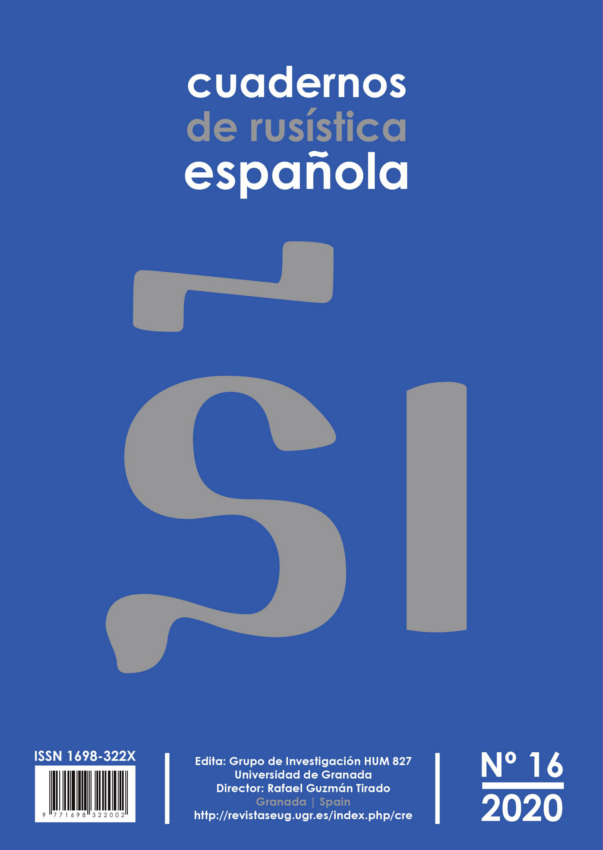Correlation of Formality, Informality, Politeness, Impoliteness and Rudeness: Discourse-Pragmatic Perspective
DOI:
https://doi.org/10.30827/cre.v16i0.15424Keywords:
politeness, impoliteness, formality, informality, rudeness, invectiveAbstract
The theory of politeness and impoliteness is currently one of the relevant interdisciplinary areas of research developing at the intersection of pragmatics, sociolinguistics, psycholinguistics, discourse analysis, cognitive linguistics and communication theory. An interdisciplinary approach to the study of im/politeness makes it possible to take a fresh look at its functioning and role in communication as well as to highlight their correlation with adjacent categories. The aim of the article is to clarify the relationship between politeness, impoliteness, formality, informality and rudeness, in perspective of discourse-pragmatics, to characterize the types of im/politeness and their functions. Illustrating with examples from Russian, English and Spanish the paper shows the need to distinguish between politeness and impoliteness at the semantic and pragmatic levels, taking into account the context and perception of the utterance by the addressee. The necessity of distinguishing between politeness and formality, impoliteness and rudeness is substantiated.Downloads
References
ALBA-JUEZ, L. (2007). On the impoliteness of some politeness strategies: A study and comparison of some pragmatic markers of impoliteness in British and American English, Peninsular Spanish and Argentinian Spanish. Studies in Intercultural, Cognitive and Social Pragmatics, 37-56.
ALBA-JUEZ, L., LARINA, T. (2018). Language and emotion: Discourse-pragmatic perspective. Russian Journal of Linguistics, 22 (1), 9-38.
ALPATOV, V.M. (2011). Categories of Politeness in Modern Japanese. 4th ezd. URS. Moscow.
BARGIELA-CHIAPPINI, F., KÁDÁR, D. (eds.) (2011). Politeness across cultures. Palgrave Macmillan. Basingstoke.
BORISOVA, E.G. (2018): Pragmatic categories of friendly communication (politeness, acceptability, appropriateness). In Politeness and anti-politeness in language and communication. Moscow: Political encyclopedia, 33-37.
BOUSFIELD, D. (2008). Impoliteness in Interaction. Amsterdam. John Benjamins Publ.
BOUSFIELD, D., LOCHER, M. A. (2008). Impoliteness in Language: Studies on its Interplay with Power in Theory and Practice. Berlin: Mouton de Gruyter.
BROWN, P., LEVINSON, S. D. (1987). Politeness: Some Universals in Language Usage. Cambridge. Cambridge University Press.
CULPEPER, J. (2011). Impoliteness: Using Language to Cause Offence. Cambridge: Cambridge University Press.
EELEN, G. (2001). A Critique of Politeness Theories. St Jerome Publishing. Manchester.
EGGINS, S., SLADE D. (1997). Analyzing casual conversation. Cassel. London, Washington.
HAUGH, M. (2007). Emic conceptualizations of (im)politeness and face in Japanese: Implications for the discursive negotiation of second language learner identities. Journal of Pragmatics, 39, 657-680.
KASPER, G. (1990). Linguistic politeness: Current research issues. Journal of Pragmatics, 14 (2), 193-218.
KAUL DE MARLANGEON, S., ALBA-JUEZ, L. (2012). A typology of verbal impoliteness behavior for the English and Spanish Cultures. Revista Española de Lingüística Aplicada, 25, 69-92.
KHARLOVA, M. L. (2014). Conceptualization of impoliteness in English and Russian. Russian Journal of Linguistics, 4, 119-131.
KIBRIK, A. A. (2009). Mode, genre and other parameters of the classification of discourses. Voprosy yazykoznanimya, 2, 3-21.
KIENPOINTNER, M. (1997). Varieties of rudeness. Functions of Language, 4 (2), 251-287.
KRYSIN, L. P. (2004). Russkoye slovo, svoye i chuzhoye: Issledovaniya po sovremennomu russkomu yazyku i sotsiolingvistike. Moscow: Languages of Slavic cultures.
LARINA, T. V. (2004): Informality as a dominant feature of the English communicative culture. In Language. Speech. Speech activity, 6: Nizhny Novgorod: Dobrolyubov Nizhny Novgorod State Linguistic University, 65-76. (In Russ.)
LARINA, T. (2006). Snizheniye formal'nosti v obshchenii kak odna iz sovremennykh tendentsiy v kommunikatsii. In M. A. Krongauz (ed.). Changes in language and communication: XXI century. Moscow: RGGU, 193-208.
LARINA, T. V. (2007). Etnostilistika v yeye kommunikativnom aspekte. The Bulletin of the Russian Academy of Sciences. Studies in Literature and Language, 66 (3), 3–17.
LARINA, T. V. (2009). Kategoriya vezhlivosti i stil' kommunikatsii: Sopostavleniye angliyskikh i russkikh lingvokul'turnykh traditsiy. Moskva: Yazyki slavyanskikh kul'tur.
LARINA, T. V. (2013). Communicative ethnic style as a way of systematizing ethnocultural characteristics of behavior, Cuadernos de Rusística Española, 9, 193-204.
LARINA, T. (2015). Culture-specific communicative styles as a framework for interpreting linguistic and cultural idiosyncrasies. International Review of Pragmatics, 7(5), 195-215.
LARINA, T. V. (2018). Politeness, impoliteness and rudeness from the perspective of intercultural communication. In Politeness and anti-politeness in language and communication. Moscow: Political Encyclopedia, 133-144.
LARINA, T. V. (2019). Emotive ecology and emotive politeness in English and Russian blind peer-review. Journal of Psycholinguistics, 1, (39), 38-57.
LARINA, T. V. OZYUMENKO V. I. GORNOSTAEVA A. A. (2012). Swear words in English communication: Meaning and functions. Journal of Psycholinguistics, 2 (16), 30-39.
LARINA, T. V., KHARLOVA, M. L. (2015). Impoliteness and rudeness in the interpersonal communication of Americans. Bulletin of Novosibirsk State University. Linguistics and Intercultural Communication Series, 13 (3), 34-42.
LEECH, G. N. (1983). Principles of Pragmatics. London and New York: Longman.
LEECH, G. (2007). Politeness: Is there an East-West divide?” Journal of Politeness Research, 3, 167-206.
LEECH, G. (2014). The Pragmatics of Politeness. Oxford / New York: Oxford University Press.
LOCHER, M. (2004). Power and politeness in action; disagreement in oral communication. Berlin: Mouton and Gruyter.
LOCHER, M., LARINA T. (2019). Introduction to politeness and impoliteness research in global contexts. Russian Journal of Linguistics, 23 (4), 873-903.
MILLS, S. (2003). Gender and politeness. Cambridge: Cambridge University Press.
SIFIANOU, M. (1992). Politeness Phenomena in England and Greece. Clarendon. Oxford.
RATHMAYR, R. (2003). Pragmatika izvineniya. Sravnitel'noye issledovaniye na materiale russkogo yazyka i russkoy kul'tury. Moscow: Yazyki slavyanskikh kul'tur [Rathmayr, Renate. 1996. Pragmatik der Entschuldigungen. Vergleichende Untersuchung amBeispiel der Russischen Sprache und Kultur. Ko¨ln: Bo¨hlau Verlag]
SIROTININA, O. B. (2003). Conversational style. Stylistic Encyclopedic Dictionary of the Russian Language. M. N. Kozhukhova (ed). Moscow: Flinta: Nauka, 319-321.
WATTS, R. (2003). Politeness. Cambridge: CUP
YURYEVA, J. B. (2020). Formality/informality as a feature of communicative ethno-style (on the material of English and Russian languages). PhD thesis.
ZEMSKAYA, E. A. (1997). Category of politeness: general issues - the national and cultural specifics of the Russian language. Zeitschrift fűr slavische Philologie. Band LVI, 2, 271-301.
ZHELVIS, V. I. (2001). Pole brani. Skvernosloviye kak sotsial'naya problema v yazykakh i kul'turakh mira. 2nd ezd. Moscow: Ladomir.
ZHELVIS, V. I. (2014). Linguocultural analysis of the dichotomy "decent-indecent "in English and Russian cultures. Russian Journal of Linguistics, 4, 101-118.












